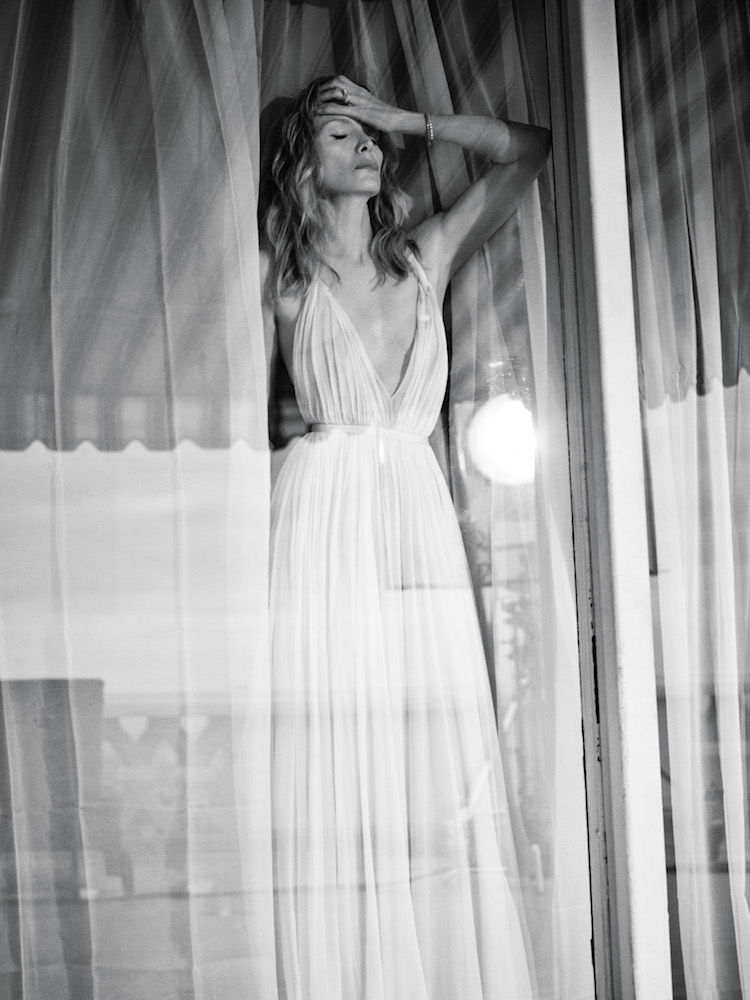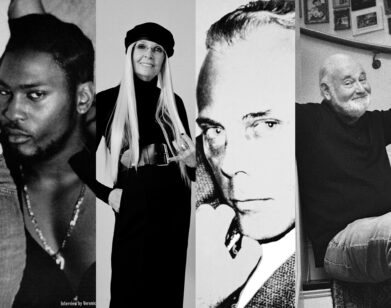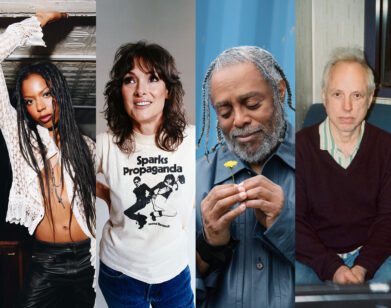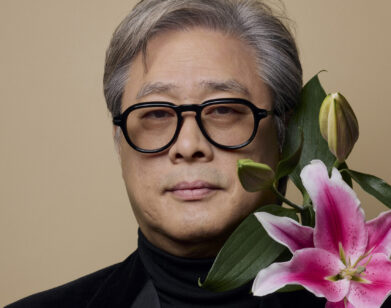Michelle Pfeiffer
In our August 1988 cover story, five years removed from her breakout performance in Scarface, and even as she acknowledged that she had “just made it to the A list,” Michelle Pfeiffer’s performances were still being given second billing to her “unforgettable” face, as our story described it. To be fair, hers is a thousand-ships sort of face. But now, nearly 30 years later, as she returns to full force in Hollywood, and returns to our cover, as beautiful as ever, can we finally acknowledge that she is both, the most beautiful and the most incredible actress—a three-time Oscar nominee who also happens to have once been crowned Miss Orange County?
We’ll have a few chances. In Barry Levinson’s HBO film The Wizard of Lies next month, Pfeiffer turns in a quietly effective performance as Ruth Madoff weathering the implosion of her life and family following the revelation of the crimes committed by her husband, Bernie (Robert De Niro). In the fall, she will appear with Jennifer Lawrence and Javier Bardem in Darren Aronofsky‘s mysterious Mother! And then, later this year, Pfeiffer will join Johnny Depp, Penelope Cruz, and Daisy Ridley for Kenneth Branagh‘s adaptation of Agatha Christie’s great Murder on the Orient Express.
It is a splashy and very welcome return to form after something of a self-imposed hiatus for Pfeiffer. As she tells Aronofsky, it was just time.
MICHELLE PFEIFFER: Did anybody forewarn you that I’m maybe, like, the worst interviewee that ever was?
DARREN ARONOFSKY: That’s an exciting way to start.
PFEIFFER: I thought it was very clever to have you because I usually don’t feel any responsibility to give up anything. I sort of bide my time until the interview is over, and I can be pretty withholding. But now, because I like you, I have to make an effort.
ARONOFSKY: Well, thank you. Now I can finally reveal all of your true secrets. It’s interesting—because we just worked together and got to know each other well—there are so many things I know about you. But sometimes I’m going to ask stupid things because people want to hear your story. I don’t know if I ever got into it with you, but how did you even know what an actor was?
PFEIFFER: That’s interesting. I’m from Orange County, Southern California, and couldn’t have been more removed from the entertainment business. In fact, I didn’t really even go to the movies much. My mother didn’t drive. My father couldn’t be bothered. So, I didn’t really go anywhere. But what I did do is I would stay up really late watching old movies on television. I can’t even tell you what they were because I was so young. But I remember watching what they were doing and saying to myself, “I can do that.”
ARONOFSKY: Wow. So, you realized that the actors were doing something? That they were actors and that there was some type of make believe going on?
PFEIFFER: I guess I did. I must have been a very dramatic child. [Aronofsky laughs] Because my mother used to call me “my little actress.” And maybe that’s it. I’m discovering this for the first time.
ARONOFSKY: There you go. I do therapy part time if the directing thing doesn’t work out.
PFEIFFER: Oh, boy, you don’t want to open yourself up there with me. Let me tell you. So, then in high school, I took theater to avoid taking an English course because I was terrible in English. And all of the kids in the theater department were thought of as being the strange kids on campus. But I felt right at home, which meant, I suppose, that I was one of those strange kids on campus. But nobody told me. And I loved it. I ditched every other class but that one. But I didn’t think about it seriously because it wasn’t in my reality at all. Then I went to court reporting school and started working at Vons supermarket.
ARONOFSKY: In high school were you ugly duckling or were you mean-girl beauty?
PFEIFFER: I don’t think I fell into either of those categories, honestly.
ARONOFSKY: Were you plain Jane?
PFEIFFER: I wasn’t plain Jane. I was a surfer chick. I ran around in flip-flops in the winter. I had long, blond, straight hair, and I just hung out at the beach.
ARONOFSKY: Did you have a boyfriend?
PFEIFFER: The only decent boyfriend I had, that I would really call a boyfriend was a baseball player. He was named after Mickey Mantle.
ARONOFSKY: Oh, wow. The pressure was on.
PFEIFFER: He was a good boyfriend. I was with him for a couple years.
ARONOFSKY: You weren’t a cheerleader?
PFEIFFER: I was a cheerleader in middle school, but I got kicked off the team because I got into trouble. I’m not going to tell you what trouble I got into. [laughs]
ARONOFSKY: Oh, come on. It was in middle school.
PFEIFFER: Nuh-huh. I can’t go there. [both laugh] If you were a really good journalist, you would find out.
ARONOFSKY: We’ll find out. So, then stenography school. Why?
PFEIFFER: Because I didn’t know what else to do. And my friend’s mother was a stenographer. I thought, “Okay, I’ll try that.” I didn’t like it. So then I was working at Vons supermarket. I was a checker. And I got kind of frustrated there. I remember distinctly standing in the check stand in a fit of desperation and wanting to tell one of these customers where they could shove this cantaloupe. I thought to myself, “What do you want to do with the rest of your life?” And it was acting.
ARONOFSKY: Lucky us.
PFEIFFER: What’s interesting is, there’s always a lot of talk to young people about finding their passion, following their passion. But I remember reading somewhere that a lot of people don’t have a passion. And there’s this pressure to have one. It’s perfectly fine not to have one. But to be lucky enough to know what that is at such a young age is really a blessing. I actually got some really positive feedback from my teacher in high school. She said that I should take it seriously. It gave me just that little bit of confidence that acting was something that I innately knew how to do. It tapped into that part of me that somehow knew when I was watching those movies on television. I read this book by two Stanford professors recently called Designing Your Life. What they saw is a lot of students, really bright students coming out of their program and not knowing what to do. So they actually designed a class called Designing Your Life. And one of the things they talk about is—and this is how I approached acting—that it’s okay to fail. You try different things. Like a designer with Post-it notes, you throw out bad idea after bad idea until you stumble upon the good one. It’s by accident. And that’s what I did. I was young enough to think, “Okay, well, I have this safe job at Vons, a good job I can make a living at, with benefits, but what I really want to do is be an actor. And I’m young enough that, if I fail, I can do something else.” And somehow I had the courage to do that. So the question was, “What do I do about it?” I was really embarrassed because I thought everybody would think I was being ridiculous and arrogant. I told one person, my hairdresser. And he said, “You have to get pictures.” I didn’t know what a head shot was. But he told me that I should enter this beauty pageant, which was very out of character for me.
ARONOFSKY: And still out of character for you.
PFEIFFER: Right? So, he comes over with an application for this beauty pageant, and I nearly threw him out of the house. He said, “Hear me out. There is a judge who is a commercial agent, and he’s been known to sign girls. I think you should do it.” So I said, “Okay, I’ll do it.” And that’s kind of how I started, traveling into Los Angeles, going on interviews. I entered some acting workshops up there. And then somebody introduced me to my first agent.
ARONOFSKY: I’m curious if you can talk about things you picked up about your craft that has changed over your career? The skills that you’ve realized are part of your method, getting ready for a role. Because any kind of wisdom you can send my way …?
PFEIFFER: I was thinking today, “Why do I hate being interviewed so much? [Aronofsky laughs] How can I explain this to poor Darren who has to do this dastardly interview with me?” And I think it may be that I have this constant fear that I’m a fraud and that I’m going to be found out. It’s true. I just got this e-mail from Steve Kloves who wrote and directed The Fabulous Baker Boys [1989], and he said, “How’s it going on Murder on the Orient Express?” which I just finished with Kenneth Branagh. And I said, “Oh, you know me. I feel like I’m ruining his movie.” Because the first week into shooting Baker Boys, I said the same thing to Steve: “I think I’m doing a terrible job in this.”
ARONOFSKY: Oh, God.
PFEIFFER: But I think that’s because I started working fairly quickly and I wasn’t ready. I didn’t have any formal training. I didn’t come from Juilliard. I was just getting by and learning in front of the world. So I’ve always had this feeling that one day they’re going to find out that I’m really a fraud, that I really don’t know what I’m doing.
ARONOFSKY: Don’t worry.
PFEIFFER: I’ve taken a lot of workshops, worked with some really masterful teachers, and I don’t know that my method has actually changed from the beginning. I still work pretty instinctually—it’s a little bit like hearing the rhythm of the character in your head.
ARONOFSKY: So, when you’re reading a script—and, say, it’s a great script that you know how to play right away—you’re hearing the character in your head and know how to play it as you’re reading it the first time?
PFEIFFER: Yes, and seeing it. The ones I get super excited about playing, yeah.
ARONOFSKY: And, of course, I’m going to make it about me: How did I do? [both laugh] When you were reading our script, did it make sense? Or you were like, “What the hell is this guy doing?”
PFEIFFER: I can’t say I understood the script the first time.
ARONOFSKY: Oh, that’s good.
PFEIFFER: Well, it’s a little bit esoteric, right?
ARONOFSKY: Do you think? [laughs]
PFEIFFER: Remember, I’m from Orange County, Darren, okay? But I definitely loved this character. I loved her. I got it. I could definitely hear it.
ARONOFSKY: I want to talk about The Age of Innocence [1993], which is one of my favorites that you’ve done. It popped into my head because that was a difficult issue with language in that one, because it’s a period piece. Were you able to see that character clearly, or did it take longer because of the kind of alien landscape that it was set in?
PFEIFFER: It seems that the less contemporary the language is, the more challenging it is. Murder on the Orient Express was deceptively challenging. It’s really well-written. I love the character and she’s really funny. The dialogue is really clever. But it has this period, 1930s vibe to it. And when you do a period movie, you don’t want to play the period. It’s one of the brilliant things that Merchant Ivory did—to not play the period in the movie. The Age of Innocence … I’m trying to remember. That was a long time ago. But when you’re doing a costume piece like that, it’s all challenging because it’s the costumes and it’s the hair …
ARONOFSKY: It’s uncomfortable.
PFEIFFER: Everything feels really confining and foreign.
ARONOFSKY: I remember where I was sitting and in which theater when I saw that movie. Those are the ones that I know are the really great experiences.
PFEIFFER: There is one shot in that that goes on forever, part of which scans across gloves while they’re getting ready for an evening, and it’s so beautiful. You love doing those long masters.
ARONOFSKY: They’re fun. I had a professor when I was first studying film, who was famous for that. He was a Hungarian director, and he would do these 30-minute-long takes, where the camera was swirling and twirling, very similar to what Iñárritu and Alfonso Cuarón have been doing—and, of course, Scorsese was a master of that type of stuff. You know, the fraud thing, this is my analysis: You have so much talent, but people blow it off with the beauty thing. When I was in film school, I had a teacher and probably the only thing that he said that stuck with me was about you. He said, “Michelle Pfeiffer—very rare where beauty and that much talent come together.” It was at that moment that I started to look at your work and became a fan.
PFEIFFER: Oh, wow.
ARONOFSKY: So, I don’t know if that makes you feel any better. But that stuck with me from 30 years ago. We should probably talk about this incredible famine we’ve had without you. What has been the reason for the resurgence, deciding to share your light with us?
PFEIFFER: Well, the first thing that comes to mind is I’m an empty nester now. I’ve never lost my love for acting. I feel really at home on the movie set. I’m a more balanced person honestly when I’m working. But I was pretty careful about where I shot, how long I was away, whether or not it worked out with the kids’ schedule. And I got so picky that I was unhirable. And then … I don’t know, time just went on. And now, you know, when the student is ready, the teacher appears. I’m more open now, my frame of mind, because I really want to work now, because I can. And these last few years I’ve had some really interesting opportunities. And I have this weird synchronicity with Annette Bening. I was supposed to do Bugsy [1991]. I fell out of that. She did it, so she met Warren [Beatty]. That wouldn’t have happened. And then she was supposed to do Batman Returns [1992]. She fell out of that. I replaced her. So, we’re always kind of tag-teaming.
ARONOFSKY: It wasn’t because of that history that I thought of you; it just made so much sense. We just haven’t seen enough of you.
PFEIFFER: Because I disappeared, yeah.
ARONOFSKY: So then everyone’s like, “Oh, my God, of course. What a great, great idea.” And then it was amazing to watch, because I do think you’re the type of actor that is very in the moment.
DARREN ARONOFSKY IS A NEW YORK-BASED FILMMAKER. HIS FILMS INCLUDE THE WRESTLER, BLACK SWAN, REQUIEM FOR A DREAM, AND NOAH.







